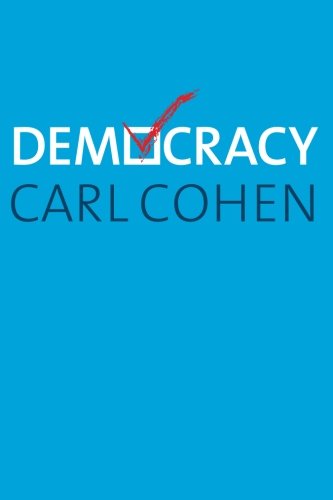By Carl Cohen

About this book
The government of any community by the members of that community is widely praised and almost universally agreed to be the best of governmental forms. But it is not so well or so deeply understood as it ought to be. This book, DEMOCRACY, is a thorough analytical account of the philosophy of democracy, in six Parts.
Part One is a discussion of the nature of democracy -- what it is, and what it is not. Democracy is government through the participation of its members or citizens. Understanding its nature fully requires an understanding of the several dimensions of participation: its breadth, its depth, and its range.
Part Two explains the presuppositions of democracy. Some underlying community, and the recognition of that community by its members, is presupposed, as is also a membership exhibiting a substantial degree of rationality.
Part Three analyzes the instruments of democracy. Agreed upon decision-making rules is a primary instrument. Majority rule, having many variations, is only one such rule, and there are likely to be different rules for decisions of different kinds. Equally essential in almost every democracy is some representative system, since direct democracy is feasible only in limited contexts.
Part Four gives a lengthy account of the conditions of democracy -- the circumstances that must be realized if democracy is to succeed. Five kinds of conditions are analyzed.
Part Five deals with the intellectual defense of democracy. Over the long run democracy is vindicated by the freedoms and other social circumstances it tends to promote. Democracy tends to produce just laws and a loyal citizenry, as well as encourage the peaceful resolution of disputes. More deeply, democracy is justified by a full understanding of its moral foundation, the fundamental equality of its members. The only system of government that can recognize this equality concretely is the one that gives to each community member the right to an equal voice in its direction.
Part Six addresses the prospects of democracy over the near and long term future. In most of the nations of the world, but not all of them, the prospects for democracy over the near term are good. But over the long term increasing population and the increasing difficulty of maintaining the conditions of democracy render its prospects much less promising. Increasing material inequalities, and above all increasing educational and intellectual inequalities, make it probable that over most of the globe democracy is not likely to meet with lasting success.
Author information
Carl Cohen (born April 30, 1931) is an American philosopher. He is Professor of Philosophy at the Residential College of the University of Michigan, in Ann Arbor, Michigan, U.S.
-
Xi urges teachers to contribute more to realizing national rejuvenation
Xi urges teachers to contribute more to realizing national rejuvenation
-
Chinese premier calls for advancing economic globalization, unity within G20
Chinese premier calls for advancing economic globalization, unity within G20
-
China's opening-up, improved business environment garner foreign investors' confidence
China's opening-up, improved business environment garner foreign investors' confidence
-
Russian-Chinese forum "Rostki" boosts practical cooperation
Russian-Chinese forum "Rostki" boosts practical cooperation